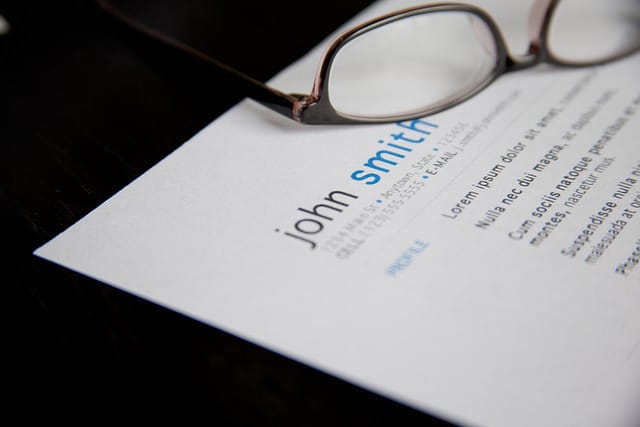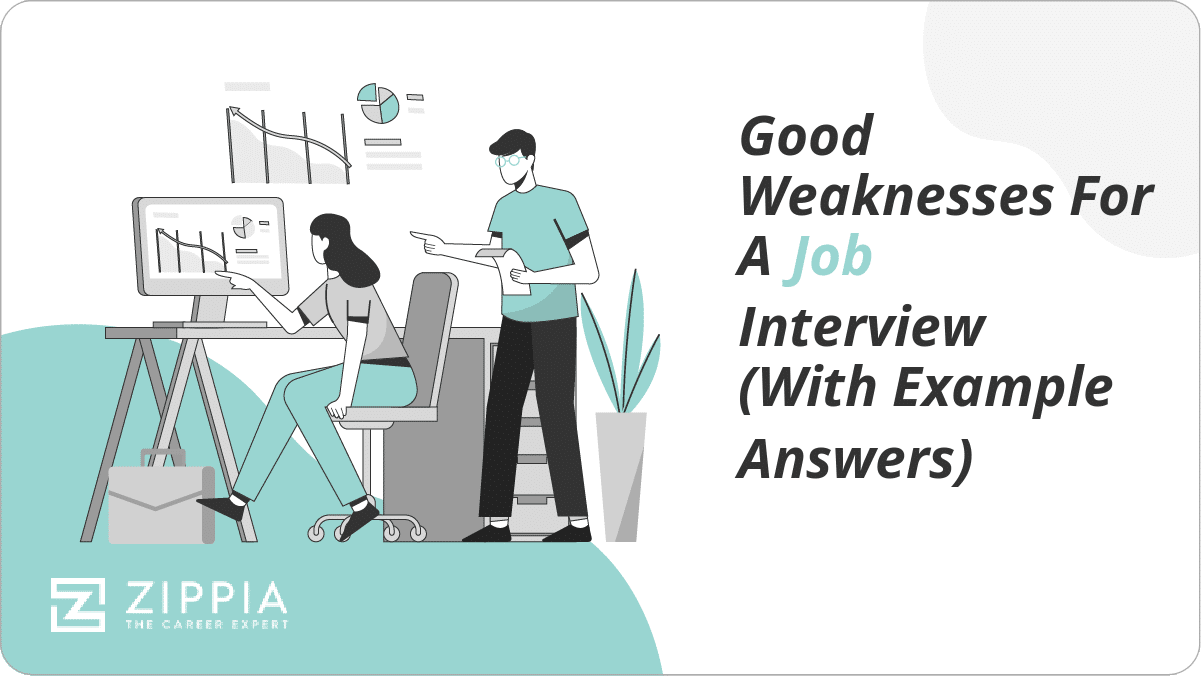- Common Questions
- Interview Questions
- How To Answer Tell Me About Yourself?
- Elevator Pitch
- Where Do You See Yourself In 5 Years?
- What Are Your Career Goals?
- When Can You Start?
- How Do You Define Success?
- Describe Your Work Ethic
- Where Are Your Current Duties?
- What Are Your Learning Goals?
- Intrinsic Vs Extrinsic Motivation
- What Is Your Desired Salary?
- What Makes You Unique?
- Why Are You The Best Person For This Job?
- Reasons For Termination
- What Are Your Work Values
- How To Make A Hard Decision?
- What Are You Most Proud Of?
- Personal Code Of Ethics
- Problem Solving Interview Questions
- Taking Initiative Example
- How Do You Prioritize Your Work
- Explain Gaps In Employment
- Most Rewarding College Experience
- What Is Your Work Style
- Tell Me About A Time When You Made A Mistake On The Job
- Tell Me About Gaps In Employment
- What Are You Passionate About
- What Skills Would You Bring To The Job
- Who Is Your Mentor?
- Tell Me About Gaps In Employment
- How To Answer Tell Me About A Time You Disagreed With Your Boss
- How To Answer Common Screening Questions
- Types Of Questions
- Situational Interview Questions
- Promotion Interview Questions
- Internal Interview Questions
- Open Ended Interview Questions
- Tough Interview Questions
- Leadership Interview Questions
- Teamwork Interview Questions
- Interview Questions About Communication
- Personality Interview Questions
- Internship Interview Questions
- Ice Breaker Questions
- Recruiter Interview Questions
- Brain Teaser Interview Questions
- Group Interview Questions
- Competency Based Interview Question
- Grad School Interview Questions
- Scrum Interview Questions
- Excel Interview Questions
- Common Phone Interview Questions And Answers
- Job Specific Questions
- Why Did You Choose Nursing?
- Why Do You Want To Be A Teacher?
- Why Do You Want To Be A Doctor?
- Why Do You Want To Be A Police Officer?
- Police Officer Interview Questions
- Why Do You Want To Be An Accountant?
- Sales Interview Questions
- Interview Questions For Managers
- Retail Interview Questions
- Teacher Interview Questions
- Accounting Interview Questions
- Teaching Philosophy Examples
- Management Philosophy Examples
- Leadership Philosophy
- What Does Customer Service Mean To You
Find a Job You Really Want In
When you’re preparing the important questions to ask a potential employee in an interview, consider asking them, “what are your career goals?”
Somewhere between questioning why they left their last job and when they can start, you will want to know more about how the candidate sees their professional future going. While it’s essential to use an interview to find out someone’s experience and skills, learning about their professional goals is key to understanding if they’re compatible with the company in the long-term.
Key Takeaways:
-
Asking a job applicant “what are your learning goals?” is a great way to judge their character because it will reveal their values and outlook.
-
You don’t just have to ask “what are your learning goals?” There are other ways to word the question that can add diversity to the applicant’s answer.
-
Motivation, education, and improvement are all great topics to look for in a candidate’s answer about career goals.
-
Many candidates will be so focused on their past work experience, they might not expect a question about their future.

10 Examples of Career Goals Interview Questions
Interviewers don’t simply have to ask the question, “what are your career goals,” to arrive at an answer that will give similar useful information.
Consider the following ten examples of career goals interview questions to gain insight into an applicant.
-
Where do you see your career going? This is a broad question about a candidate’s intention for their career. It’s a little more casual and conversational than asking flat out what their career goals are. It can be a useful question in any industry and for a candidate at any level because it leads them to describe what they’d like to accomplish professionally in the future.
If their mindset for where they see their career going lines up with your company trajectory, they might be the right candidate to hire.
How to assess their answer: You should assess the interviewee’s response to this question for aspiration and authenticity. You should be looking for a person who is confident in their abilities and has a clear trajectory for where they’d like their career to go. You also want an applicant who answers honestly and realistically based on their experience.
Example Answer
“I see my career going in a upward direction of growth. Wherever I am, whatever I am doing, I want to grow. I want my skills to improve, I want my network to build, and most importantly I want to feel like the work I do results in a net benefit to myself, my workplace, and my community.”
-
What motivates you? Asking an applicant what motivates them is an excellent way to evaluate what they value in their life and career. People have different motivations. For some, it’s wealth or power. For others, it’s making a positive difference in the world or creating a great product. Finding out what motivates an interviewee will show you want is driving their effort and where their career is probably headed.
How to assess their answer: Look for an applicant who has positive motivations. You want to avoid someone whose answer is sarcastic or shallow. Ideally, someone is motivated by things like being the best employee they can be or producing brilliant work. While many people may very well be motivated by authority or wealth, there’s a way a candidate can answer that demonstrates their professional abilities. Pay attention to a candidate who can articulate their motivations, even less altruistic ones, positively.
Example Answer
“I am motivated by the feeling that my efforts mean something. I look for work, projects, and challenges that give me purpose. At the end of every day I want to feel like I did my best to achieve this goal.”
-
Where do you see yourself In five years? This is a good question for gathering insight into what an applicant’s plans are for the near future. You can also extend the time-line to ten or twenty years to see how organized and clear they are in their planning.
It’s a good question to learn what an applicant’s goals are and what growth they hope to achieve within your company.
How to assess their answer: When listening to an applicant’s response about where they see themselves in five years, consider where you want them to be in the company in that timeline.
Do you expect this to be an employee who stays with the team for longer than five years? Does their answer for how they envision their professional future match what your company needs to fill in this role?
Consider these questions when assessing a candidate’s answer.
Example Answer
“In five years I see myself more educated and experience at my profession. I’d like to develop my skills further and go from the intermediate level I am at today, to an advanced level. I see myself as someone who could be a mentor to my younger self.”
-
Do you plan to pursue more education? Questioning whether an applicant intends to pursue more schooling can help an interviewer looking to fill an adaptable role. Student-learning is an excellent way to sharpen soft-skills associated with a strong employee and become proficient in additional hard skills. An applicant who is considering further study in a discipline related to your company can also make for an employee whose abilities will continue to grow with time.
How to assess their answer: As the employer, you know what qualities you’re looking for in a potential employee. Suppose the position you’re hiring for will require full-time plus possible overtime to fulfill initial responsibilities. In that case, an applicant whose going to school soon may not have enough time for it. On the other hand, if the role is flexible and you’re looking for a candidate who’s always learning, this could be a benefit.
Example Answer
“I’d like to go back to school, but most likely on a part-time basis. I do not want to sacrifice my career. Instead I want my education to further my career. I think I may seek out educational opportunities that will provide me new tools and skills to better my professional life.”
-
Do you think this position fits your professional goals and objectives? When interviewing a potential employee, you should gear the questions towards receiving informative and illuminating answers. One way to do that is by asking them how they think the position is right for them in their career journey. Their explanation of why they believe this position aligns with their professional objectives for the future may resonate with the company’s ideal candidate profile.
How to assess their answer: Pay attention to how familiar the applicant is with the position and company they’re interviewing for when asking this question. It can be a good preview of their preparedness.
Listen to the goals that they choose to focus on during this question. Are these objectives that make sense in the position you’re hiring for?
Example Answer
“Yes, I do believe this position fits with my professional goals. It is my goal to become a more effective and agile software developer. This position is at the forefront of a lot of new technological developments, so I believe I will learn a lot and become the person I want to be from the experience.”
-
Tell me about your greatest accomplishment and how you got there. Asking about an applicant’s most remarkable achievements can help you get to know them in a couple of ways. First of all, it lets you see what they define as their greatest success in their career thus far. This can let you know what their experience level is like and how they define success.
Additionally, the kind of accomplishment they choose to talk about can speak volumes about how they accomplish goals.
How to assess their answer: Consider their response for tone. When talking about their accomplishments, do they come across as humble, conceited, or confident? These qualities make for very different kinds of employees who tackle their goals in varying ways. Think about if this personality will fit well in your work environment.
You should also be taking note of their explanation of how they achieved their most significant accomplishment. The way they handled this former success is probably how they’ll approach working for your organization.
Example Answer
“My greatest accomplishment would have to be the time at my previous job when I was tasked to lead a team in organizing our annual marketing campaign. Due to several factors, we were short staffed, however my team and I were able to equally distribute responsibilities. We met frequently to monitored our progress, and my team was very responsive to my initiatives.
I was, in turn, very grateful for their input and efforts. We had a successful campaign that resulted in 20% growth of our userbase. I was acknowledged by upper management, however I was just as proud of my team, in part for how happy they were with the end result. Together we made a significant impact and I learned a lot in the process.”
-
If you could change one thing about yourself, what would it be? This question is a revealing one. It’s key to listen to how a candidate describes their accomplishments, but it’s also very telling to see how they handle talking about their shortcomings.
Just like goals for positive advancement in their career, asking about some of their negative traits can show you how they plan to work on themselves in the future.
How to assess their answer: This question may catch many interviewees off guard, which will probably make their response a little more genuine. People are naturally uncomfortable when talking about their flaws or insecurities. How they present their less than desirable qualities can show you how well they can handle dealing with negatives in the workplace.
Assess their answer for both honesty and how they work on this flaw.
Example Answer
“I am not good at public speaking. Anytime I’m in a meeting or presentation, I seem to fumble with my words and lose my train of thought. I want to make it my goal to get better at this and I am considering signing up for workshops related to public speaking.”
-
Why do you want to work for us? The question of why an interviewee wants the position can clue you into aspects of their motivations and goals. It can also show how prepared they came for the interview, based on how relevant their answer is to the specific position and company.
Beyond the nuances that this question can put you on to, it’s a straightforward question that results in an honest answer about the candidate’s interest in the role. That’s vital information to know before hiring someone.
How to assess their answer: Since this is a straightforward question, you should be listening for a direct response. Strong answers will involve knowing the company and sincerely explaining why they feel it would be a good fit for their career. Bonus points if they can also incorporate why they’re an ideal candidate for the role in their answer.
Example Answer
“I want to work for you because I believe in this company’s mission. You clearly value having a positive social impact that goes beyond making a profit. You want to see your efforts result in a better future for everyone and I feel the same way about myself. I want to be a part of something that leads our community into a healthier world.”
-
Why are you looking for a new position? In addition to asking questions about the applicant’s plans for their future, you should also gain insight into why they’re looking for a new job. How an interviewee speaks about their former or current positions says a lot about who they are as an employee and how they might behave.
A candidate who can articulate why they’re seeking a new position professionally and how it lines up with their goals shows strong employee potential.
How to assess their answer: When answering this question, many candidates will be forced to talk about their former position and why they’re moving on from it. Take this opportunity to see how they speak about their current or former job and if they can communicate the need for the change in a productive way.
The chances are that if an applicant talks about their former employer rudely, they could do the same to your company one day.
Example Answer
“Truthfully, I’m bored at my current job. I have been in the same position for six years and although I have done a lot of great work, I feel it has become repetitive. I also don’t see any potential for growth at my current job, whereas here I am excited by the opportunities available.”
-
What do you do to achieve your professional goals? If all else fails, simply asking an applicant bluntly how they go about achieving their goals can help get a good answer. After all, nobody has more insight into their work habits than the candidate themselves. Their response may be able to give you a lot of clarification into their work ethic and goal-setting.
How to assess their answer: This is a difficult question to answer on the spot in an interview, and if an applicant can do it well, it’s a safe bet that they have potential. You should be looking for an answer that concisely states how they’ve achieved their goals in the past and what they intend to do in the future to continue meeting their goals.
Example Answer
“To achieve my goals I do two things. First, I share them with someone, preferably a supervisor, to help hold me accountable. Second, I track my progress in my journal. At least once a week I reflect on the status of my goals, what I have done, where they are, and what I could be doing better.”
Why Ask About a Candidate’s Career Goals in Interviews
Employers interview applicants before offering them a position to get a better read on their skills and make a more educated hiring decision. Of course, there’s some basic ground you need to cover about where they’ve been and who they are, but learning more about their career objectives is equally as important.
It’s pivotal to ask questions about an interviewee’s goals and prospects for a few reasons. Observing how a candidate answers questions involving their career goals will tell you a lot about themselves. It can give you insight into where they plan to be five, ten, and twenty years from now and what they’d like to accomplish in that time.
Additionally, this is a question that may shock a lot of unprepared candidates. Many applicants may come to an interview prepared with answers to questions about their previous work experience. However, fewer have considered questions involving their hopes and goals for the future. This can result in a more honest answer that gives a good idea about the interviewee’s values.
It’s better to know exactly what an applicant’s aspirations are in the interview stage. Once you learn the candidate’s goals early, you can decide if this is the kind of employee that would be compatible with your organization’s future prospects, instead of being surprised later if it seems like you don’t see eye-to-eye, goal-wise.
- Common Questions
- Interview Questions
- How To Answer Tell Me About Yourself?
- Elevator Pitch
- Where Do You See Yourself In 5 Years?
- What Are Your Career Goals?
- When Can You Start?
- How Do You Define Success?
- Describe Your Work Ethic
- Where Are Your Current Duties?
- What Are Your Learning Goals?
- Intrinsic Vs Extrinsic Motivation
- What Is Your Desired Salary?
- What Makes You Unique?
- Why Are You The Best Person For This Job?
- Reasons For Termination
- What Are Your Work Values
- How To Make A Hard Decision?
- What Are You Most Proud Of?
- Personal Code Of Ethics
- Problem Solving Interview Questions
- Taking Initiative Example
- How Do You Prioritize Your Work
- Explain Gaps In Employment
- Most Rewarding College Experience
- What Is Your Work Style
- Tell Me About A Time When You Made A Mistake On The Job
- Tell Me About Gaps In Employment
- What Are You Passionate About
- What Skills Would You Bring To The Job
- Who Is Your Mentor?
- Tell Me About Gaps In Employment
- How To Answer Tell Me About A Time You Disagreed With Your Boss
- How To Answer Common Screening Questions
- Types Of Questions
- Situational Interview Questions
- Promotion Interview Questions
- Internal Interview Questions
- Open Ended Interview Questions
- Tough Interview Questions
- Leadership Interview Questions
- Teamwork Interview Questions
- Interview Questions About Communication
- Personality Interview Questions
- Internship Interview Questions
- Ice Breaker Questions
- Recruiter Interview Questions
- Brain Teaser Interview Questions
- Group Interview Questions
- Competency Based Interview Question
- Grad School Interview Questions
- Scrum Interview Questions
- Excel Interview Questions
- Common Phone Interview Questions And Answers
- Job Specific Questions
- Why Did You Choose Nursing?
- Why Do You Want To Be A Teacher?
- Why Do You Want To Be A Doctor?
- Why Do You Want To Be A Police Officer?
- Police Officer Interview Questions
- Why Do You Want To Be An Accountant?
- Sales Interview Questions
- Interview Questions For Managers
- Retail Interview Questions
- Teacher Interview Questions
- Accounting Interview Questions
- Teaching Philosophy Examples
- Management Philosophy Examples
- Leadership Philosophy
- What Does Customer Service Mean To You





